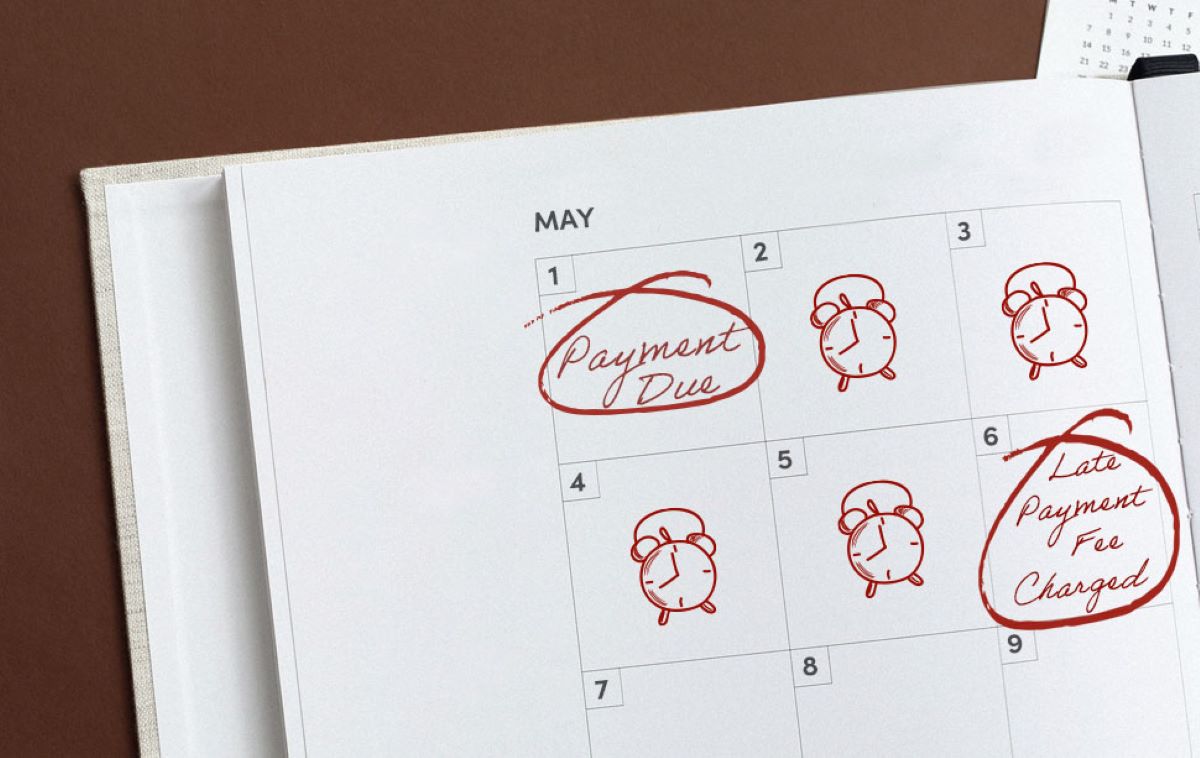

Finance
How To Ask To Waive A Late Fee
Published: February 22, 2024
Learn effective strategies for asking to waive a late fee in the finance industry. Discover expert tips to negotiate and save money.
(Many of the links in this article redirect to a specific reviewed product. Your purchase of these products through affiliate links helps to generate commission for LiveWell, at no extra cost. Learn more)
Table of Contents
Introduction
Introduction
Dealing with late fees can be a frustrating experience, especially when unexpected circumstances lead to missed payments. However, many financial institutions and service providers understand that unforeseen events can impact a person’s ability to make timely payments. In such cases, it’s often possible to request a waiver for the late fee. This article aims to provide guidance on how to effectively ask for a late fee to be waived, helping individuals navigate this process with confidence and professionalism.
Understanding the late fee policy, gathering relevant information, and crafting a polite request are essential steps in making a compelling case for a late fee waiver. Additionally, knowing how to initiate contact with the company and following up on the request can significantly impact the outcome. By following the strategies outlined in this article, individuals can increase their chances of having a late fee waived while maintaining a positive relationship with the company.
Whether it’s a credit card issuer, utility provider, landlord, or another entity, the principles of requesting a late fee waiver can be applied universally. With a clear understanding of the process and effective communication, individuals can navigate these situations with professionalism and increase the likelihood of a favorable outcome.
Understand the Late Fee Policy
Before initiating a request to waive a late fee, it’s crucial to have a comprehensive understanding of the company’s late fee policy. This policy is typically outlined in the terms and conditions provided at the time of signing up for a service or financial product. Understanding the specific details of the late fee policy enables individuals to determine their eligibility for a waiver and provides valuable insights into the company’s procedures.
Key aspects to consider when reviewing the late fee policy include the grace period, the amount of the late fee, and any potential repercussions for multiple late payments. The grace period refers to the duration after the payment due date during which a payment can be made without incurring a late fee. Some companies offer a grace period as a courtesy, providing customers with additional time to submit their payments without penalty.
Additionally, familiarizing oneself with the late fee amount is essential. Some companies impose a flat fee for late payments, while others calculate the late fee based on a percentage of the outstanding balance. Understanding the specific late fee structure empowers individuals to assess the financial impact of the late payment and make informed decisions regarding their request for a waiver.
Furthermore, it’s important to be aware of any potential consequences associated with repeated late payments. Some companies may escalate their actions if late payments become a recurring issue, which could impact an individual’s credit score or result in additional fees. By understanding the potential ramifications of multiple late payments, individuals can approach the situation proactively and take steps to prevent future occurrences.
Ultimately, a thorough understanding of the late fee policy equips individuals with the knowledge needed to navigate the waiver request process effectively. By being well-informed about the company’s policies and procedures, individuals can approach the subsequent steps with confidence and clarity, increasing the likelihood of a successful outcome.
Gather Relevant Information
When preparing to request a waiver for a late fee, gathering relevant information is a crucial step that can significantly strengthen the case for the waiver. This information serves to provide context and support the individual’s request, demonstrating a responsible payment history and a genuine commitment to meeting financial obligations.
One essential piece of information to gather is the specific details of the late payment in question. This includes the date the payment was due, the date it was submitted, and any relevant confirmation or transaction numbers associated with the payment. Having a clear timeline of the payment process can help substantiate the reasons for the late payment and showcase the individual’s diligence in addressing the issue.
Additionally, it can be beneficial to assess the individual’s payment history with the company. If the late payment is an isolated occurrence in an otherwise punctual payment record, highlighting this history can reinforce the request for a waiver. Conversely, if there have been previous late payments, being transparent about any extenuating circumstances surrounding those instances can add depth to the waiver request.
Furthermore, if there were any mitigating factors that contributed to the late payment, such as unexpected financial challenges, medical emergencies, or technical issues with payment processing, documenting these circumstances can provide valuable context for the waiver request. Providing evidence, such as medical bills, correspondence with financial institutions, or technical support communications, can lend credibility to the request and demonstrate the individual’s proactive approach to resolving the situation.
Lastly, it’s important to review any communications or notices received from the company regarding the late payment. Understanding the company’s perspective and any formal communications they have issued can inform the tone and content of the waiver request, ensuring that it is aligned with the company’s expectations and policies.
By gathering and organizing this relevant information, individuals can present a compelling case for a late fee waiver, demonstrating responsibility, transparency, and a genuine commitment to resolving the situation. This proactive approach can significantly enhance the effectiveness of the waiver request and increase the likelihood of a positive outcome.
Craft a Polite Request
When requesting a waiver for a late fee, the manner in which the request is presented can greatly influence the company’s response. Crafting a polite and well-structured request is essential to convey professionalism and respect while articulating the reasons for the late payment. An effective request should aim to empathize with the company’s policies, provide a clear explanation of the circumstances, and express a commitment to maintaining a positive payment history.
Begin by addressing the request to the appropriate department or individual within the company. If possible, personalize the request by using the recipient’s name, which can help create a more personable and respectful tone. Opening the request with a polite greeting, such as “Dear [Recipient’s Name]” or “To Whom It May Concern,” sets a courteous and considerate tone for the communication.
Expressing understanding of the company’s late fee policy is an important element of the request. Acknowledge the late fee as a standard procedure and convey appreciation for the company’s commitment to maintaining clear payment terms. This demonstrates respect for the company’s policies and can positively influence the recipient’s perception of the request.
When explaining the circumstances surrounding the late payment, be transparent and concise. Clearly outline any mitigating factors that contributed to the late payment, such as unexpected financial challenges, family emergencies, or technical issues. It’s important to convey sincerity and responsibility while avoiding overly emotional language or excessive detail that could detract from the main points of the request.
Additionally, reaffirm the commitment to timely payments and maintaining a positive relationship with the company. Emphasize any measures taken to prevent future late payments and highlight the individual’s history of responsible financial behavior. This proactive approach demonstrates a genuine desire to rectify the situation and reinforces the request for a waiver.
Concluding the request with a polite closing, such as “Thank you for your attention to this matter” or “I appreciate your consideration,” adds a courteous and professional touch to the communication. Including contact information for follow-up purposes can also facilitate ongoing communication regarding the request.
By crafting a polite and well-structured request, individuals can effectively convey their circumstances while maintaining a respectful and professional demeanor. This approach increases the likelihood of the company considering the request favorably and demonstrates the individual’s commitment to responsible financial conduct.
Contacting the Company
Once the late fee waiver request is prepared, the next step is to initiate contact with the company. Choosing the appropriate method of communication and addressing the request to the right department or individual can significantly impact the effectiveness of the request.
If the company provides a specific contact channel for billing inquiries or customer support, reaching out through this designated channel is advisable. This ensures that the request is directed to the appropriate department, increasing the likelihood of a timely and relevant response. In cases where there is no designated channel, contacting the company’s general customer service line or utilizing their online messaging platform can be effective alternatives.
When reaching out to the company, it’s important to clearly and concisely articulate the purpose of the communication. Clearly state that the inquiry pertains to a late fee waiver request, providing any relevant account or reference numbers to facilitate the handling of the request. Additionally, if a specific individual was identified as the appropriate contact for such inquiries, addressing the communication to that individual can personalize the interaction and potentially expedite the handling of the request.
When communicating the late fee waiver request, it’s important to maintain a polite and professional tone throughout the interaction. Clearly and transparently convey the reasons for the late payment, emphasizing any mitigating circumstances and the commitment to maintaining a positive payment history. This approach demonstrates responsibility and consideration while presenting a compelling case for the waiver.
Following the company’s guidelines for communication and adhering to any specific requirements for late fee waiver requests can also enhance the effectiveness of the interaction. Some companies may have established procedures or forms for submitting waiver requests, and adhering to these guidelines demonstrates respect for the company’s policies and procedures.
After submitting the request, it’s advisable to note the date and method of communication for future reference. This can be valuable for tracking the progress of the request and facilitating follow-up communication if necessary. Maintaining a record of the interaction can also provide documentation in the event of further inquiries or escalations.
By approaching the company with professionalism, clarity, and respect, individuals can optimize their chances of having their late fee waiver request considered favorably. Effective communication and adherence to the company’s procedures can contribute to a positive and constructive interaction, potentially leading to a successful resolution of the late fee issue.
Follow Up and Next Steps
Following the initial communication with the company regarding the late fee waiver request, it’s important to be proactive in following up on the request and taking the necessary next steps to ensure a timely resolution. Effective follow-up communication and a clear understanding of potential next steps can contribute to a successful outcome and demonstrate a commitment to addressing the late fee issue.
If a specific timeframe for a response to the late fee waiver request was provided by the company, it’s advisable to wait until that timeframe has elapsed before initiating follow-up communication. This allows the company sufficient time to review the request and respond accordingly. If no specific timeframe was provided, a reasonable period, such as one to two weeks, can be considered appropriate before initiating follow-up communication.
When following up on the late fee waiver request, it’s important to maintain a courteous and respectful tone, reiterating the purpose of the communication and referencing the initial request. Clearly and concisely express the desire to inquire about the status of the late fee waiver request, providing any relevant reference numbers or details to facilitate the company’s handling of the follow-up communication.
During the follow-up communication, it can be beneficial to reaffirm the commitment to resolving the late fee issue and maintaining a positive relationship with the company. This demonstrates a proactive and responsible approach to addressing the situation while maintaining professionalism and respect in the interaction.
If the company has provided a response to the late fee waiver request, carefully review the contents of the response to understand the outcome and any additional steps that may be required. In the case of a favorable response granting the waiver, expressing gratitude for the company’s consideration and prompt resolution can further nurture a positive relationship.
If the initial late fee waiver request was not granted, individuals may consider exploring alternative options or escalating the matter within the company, if applicable. This may involve seeking clarification on the reasons for the denial and exploring any potential avenues for reconsideration or appeal.
Throughout the follow-up and next steps, maintaining clear and respectful communication with the company is essential. By demonstrating a proactive and considerate approach, individuals can navigate the late fee waiver process with professionalism and increase the likelihood of a satisfactory resolution.














